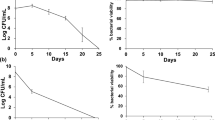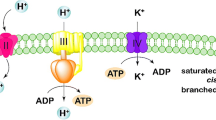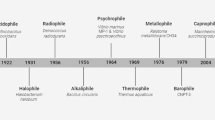Abstract
Microbial biodegradation serves as an effective approach to treat oil pollution. However, the application of such methods for the degrading long-chain alkanes still encounters significant challenges. Comparative proteomics has extensively studied the intracellular proteins of bacteria that degrade short- and medium-chain alkanes, but the role and mechanism of extracellular proteins in many microorganism remain unclear. To enhance our understanding of the roles of extracellular proteins in the adaptation to long-chain alkanes, a label-free LC–MS/MS strategy was applied for the relative quantification of extracellular proteins of Pseudomonas aeruginosa SJTD-1-M (ProteomeXchange identifier PXD014638). 444 alkane-sentitive proteins were acquired and their cell localization analysis was performed using the Pseudomonas Genome Database. Among them, 111 proteins were found to be located in extracellular or Outer Membrane Vesicles (OMVs). The alkane-induced abundance of 11 extracellular or OMV target proteins was confirmed by parallel reaction monitoring (PRM). Furthermore, we observed that the expression levels of three proteins (Pra, PA2815, and FliC) were associated with the carbon chain length of the added alkane in the culture medium. The roles of these proteins in cell mobility, alkane emulsification, assimilation, and degradation were further discussed. OMVs were found to contain a number of enzymes involved in alkane metabolism, fatty acid beta-oxidation, and the TCA cycle, suggesting their potential as sites for facilitated alkane degradation. In this sense, this exoproteome analysis contributes to a better understanding of the role of extracellular proteins in the hydrocarbon treatment process.






Similar content being viewed by others
Data availability
The data that support the findings of this study are openly available in the Proteome Xchange depository at http://www.ebi.ac.uk/pride/archive/projects/PXD014638, reference number PXD014638.
References
Abbasnezhad H, Gray M, Foght JM (2011) Influence of adhesion on aerobic biodegradation and bioremediation of liquid hydrocarbons. Appl Microbiol Biotechnol 92:653–675. https://doi.org/10.1007/s00253-011-3589-4
Arora SK, Ritchings BW, Almira EC, Lory S, Ramphal R (1998) The Pseudomonas aeruginosa flagellar cap protein, FliD, is responsible for mucin adhesion. Infect Immun 66:1000–1007
Bankaitis VA, Aitken JR, Cleves AE, Dowhan W (1990) An essential role for a phospholipid transfer protein in yeast Golgi function. Nature 347(6293):561–562. https://doi.org/10.1038/347561a0
Barkovits K, Chen W, Kohl M, Bracht T (2021) Targeted protein quantification using parallel reaction monitoring (PRM). Methods Mol Biol 2228:145–157. https://doi.org/10.1007/978-1-0716-1024-4_11
Bauman SJ, Kuehn MJ (2006) Purification of outer membrane vesicles from Pseudomonas aeruginosa and their activation of an IL-8 response. Microbes Infect 8:2400–2408. https://doi.org/10.1016/j.micinf.2006.05.001
Bleves S, Viarre V, Salacha R, Michel GPF, Filloux A, Voulhoux R (2010) Protein secretion systems in Pseudomonas aeruginosa: a wealth of pathogenic weapons. Int J Med Microbiol 300:534–543. https://doi.org/10.1016/j.ijmm.2010.08.005
Boekema BKHL, Beselin A, Breuer M, Hauer B, Koster M, Rosenau F, Jaeger K-E, Tommassen J (2007) Hexadecane and Tween 80 stimulate lipase production in Burkholderia glumae by different mechanisms. Appl Environ Microbiol 73:3838–3844. https://doi.org/10.1128/AEM.00097-07
Borrero-de Acuña JM, Molinari G, Rohde M, Dammeyer T, Wissing J, Jänsch L, Arias S, Jahn M, Schobert M, Timmis KN, Jahn D (2015) A periplasmic complex of the nitrite reductase NirS, the chaperone DnaK, and the flagellum protein FliC is essential for flagellum assembly and motility in Pseudomonas aeruginosa. J Bacteriol 197:3066–3075. https://doi.org/10.1128/JB.00415-15
Boulant T, Boudehen YM, Filloux A, Plesiat P, Naas T, Dortet L (2018) Higher prevalence of PldA, a Pseudomonas aeruginosa trans-kingdom H2-type VI secretion system effector, in clinical isolates responsible for acute infections and in multidrug resistant strains. Front Microbiol 9(2578):2018. https://doi.org/10.3389/fmicb.2018.02578.eCollection
Bruns CM, Nowalk AJ, Arvai AS, McTigue MA, Vaughan KG, Mietzner TA, McRee DE (1997) Structure of Haemophilus influenzae Fe(+3)-binding protein reveals convergent evolution within a superfamily. Nat Struct Biol 4:919–924. https://doi.org/10.1038/nsb1197-919
Cahan R, Axelrad I, Safrin M, Ohman DE, Kessler E (2001) A secreted aminopeptidase of Pseudomonas aeruginosa. Identification, primary structure, and relationship to other aminopeptidases. J Biol Chem 276:43645–43652. https://doi.org/10.1074/jbc.M106950200
Call TP, Akhtar MK, Baganz F, Grant C (2016) Modulating the import of medium-chain alkanes in E. coli through tuned expression of FadL. J Biol Eng 10:5. https://doi.org/10.1186/s13036-016-0026-3
Choi D-S, Kim D-K, Choi SJ, Lee J, Choi J-P, Rho S, Park S-H, Kim Y-K, Hwang D, Gho YS (2011) Proteomic analysis of outer membrane vesicles derived from Pseudomonas aeruginosa. Proteomics 11:3424–3429. https://doi.org/10.1002/pmic.201000212
Eberlein C, Starke S, Doncel ÁE, Scarabotti F, Heipieper HJ (2019) Quantification of outer membrane vesicles: a potential tool to compare response in Pseudomonas putida KT2440 to stress caused by alkanols. Appl Microbiol Biotechnol 103(10):4193–4201. https://doi.org/10.1007/s00253-019-09812-0
Ennouri H, d’Abzac P, Hakil F, Branchu P, Naïtali M, Lomenech A-M, Oueslati R, Desbrières J, Sivadon P, Grimaud R (2017) The extracellular matrix of the oleolytic biofilms of Marinobacter hydrocarbonoclasticus comprises cytoplasmic proteins and T2SS effectors that promote growth on hydrocarbons and lipids. Environ Microbiol 19:159–173. https://doi.org/10.1111/1462-2920.13547
Fiocca R, Necchi V, Sommi P, Ricci V, Telford J, Cover TL, Solcia E (1999) Release of Helicobacter pylori vacuolating cytotoxin by both a specific secretion pathway and budding of outer membrane vesicles. Uptake of released toxin and vesicles by gastric epithelium. J Pathol 188:220–226. https://doi.org/10.1002/(SICI)1096-9896(199906)188:2%3c220::AID-PATH307%3e3.0.CO;2-C
Foster JW (1962) Chapter 6—Bacterial oxidation of hydrocarbons**dedicated to the memory of a contemporary pioneer in hydrocarbon microbiology—Dr. R. J. Strawinski, who died January 27, 1961. The literature coverage for material in this article was concluded March 31, 1961. Preparation of this paper was aided by a National Science Foundation research grant. In: Hayaishi O (ed) Oxygenases. Academic Press, pp 241–271. https://doi.org/10.1016/B978-1-4832-3234-8.50010-1
Frisk A, Jyot J, Arora SK, Ramphal R (2002) Identification and functional characterization of flgM, a gene encoding the anti-sigma 28 factor in Pseudomonas aeruginosa. J Bacteriol 184:1514–1521. https://doi.org/10.1128/JB.184.6.1514-1521.2002
Gerritzen MJH, Martens DE, Uittenbogaard JP, Wijffels RH, Stork M (2019) Sulfate depletion triggers overproduction of phospholipids and the release of outer membrane vesicles by Neisseria meningitidis. Sci Rep 9:4716. https://doi.org/10.1038/s41598-019-41233-x
Grady SL, Malfatti SA, Gunasekera TS, Dalley BK, Lyman MG, Striebich RC, Mayhew MB, Zhou CL, Ruiz ON, Dugan LC (2017) A comprehensive multi-omics approach uncovers adaptations for growth and survival of Pseudomonas aeruginosa on n-alkanes. BMC Genomics 18:334. https://doi.org/10.1186/s12864-017-3708-4
Guerrero-Mandujano A, Hernández-Cortez C, Ibarra JA, Castro-Escarpulli G (2017) The outer mem brane vesicles: secretion system type zero. Traffic 18:425–432. https://doi.org/10.1111/tra.12488
Gunasekera TS, Striebich RC, Mueller SS, Strobel EM, Ruiz ON (2013) Transcriptional profiling suggests that multiple metabolic adaptations are required for effective proliferation of Pseudomonas aeruginosa in jet fuel. Environ Sci Technol 47:13449–13458. https://doi.org/10.1021/es403163k
Harding CJ, Bischoff M, Bergkessel M, Czekster CM (2023) An anti-biofilm cyclic peptide targets a secreted aminopeptidase from P. aeruginosa. Nat Chem Biol 19:1158–1166. https://doi.org/10.1038/s41589-023-01373-8
Haurat MF, Elhenawy W, Feldman MF (2015) Prokaryotic membrane vesicles: new insights on biogenesis and biological roles. Biol Chem 396:95–109. https://doi.org/10.1515/hsz-2014-0183
Hemamalini R, Khare S (2014) A proteomic approach to understand the role of the outer membrane porins in the organic solvent-tolerance of Pseudomonas aeruginosa PseA. PLoS ONE 9:e103788. https://doi.org/10.1371/journal.pone.0103788
Hemamalini R, Kumar Khare S (2015) Secretome analysis of a Pseudomonas aeruginosa strain grown under high alkane stress. CP 12:202–208. https://doi.org/10.2174/157016461203151120094228
Hesterkamp T, Bukau B (1996) The Escherichia coli trigger factor. FEBS Lett 389(1):32–34. https://doi.org/10.1016/0014-5793(96)00582-0
Hong HJ, Kim TH, Song WS, Ko H-J, Lee G-S, Kang SG, Kim P-H, Yoon S (2018) Crystal structure of FlgL and its implications for flagellar assembly. Sci Rep 8:14307. https://doi.org/10.1038/s41598-018-32460-9
Hua F, Wang HQ (2014) Uptake and trans-membrane transport of petroleum hydrocarbons by microorganisms. Biotechnol Biotechnol Equip 28:165–175. https://doi.org/10.1080/13102818.2014.906136
Kato S, Kowashi Y, Demuth DR (2002) Outer membrane-like vesicles secreted by Actinobacillus actinomycetemcomitans are enriched in leukotoxin. Microb Pathog 32:1–13. https://doi.org/10.1006/mpat.2001.0474
Kulp A, Kuehn MJ (2010) Biological functions and biogenesis of secreted bacterial outer membrane vesicles. Annu Rev Microbiol 64:163–184. https://doi.org/10.1146/annurev.micro.091208.073413
Lange V, Picotti P, Domon B, Aebersold R (2008) Selected reaction monitoring for quantitative proteomics: a tutorial. Mol Syst Biol 4:222. https://doi.org/10.1038/msb.2008.61
Lee E-Y, Choi D-Y, Kim D-K, Kim J-W, Park JO, Kim S, Kim S-H, Desiderio DM, Kim Y-K, Kim K-P, Gho YS (2009) Gram-positive bacteria produce membrane vesicles: proteomics-based characterization of Staphylococcus aureus-derived membrane vesicles. Proteomics 9:5425–5436. https://doi.org/10.1002/pmic.200900338
Li Z, Clarke AJ, Beveridge TJ (1996) A major autolysin of Pseudomonas aeruginosa: subcellular distribution, potential role in cell growth and division and secretion in surface membrane vesicles. J Bacteriol 178:2479–2488. https://doi.org/10.1128/jb.178.9.2479-2488.1996
Liu H, Liang R, Tao F, Ma C, Liu Y, Liu X, Liu J (2012) Genome sequence of Pseudomonas aeruginosa strain SJTD-1, a bacterium capable of degrading long-chain alkanes and crude oil. J Bacteriol 194:4783–4784. https://doi.org/10.1128/JB.01061-12
Liu H, Sun WB, Liang RB, Huang L, Hou JL, Liu JH (2015) iTRAQ-based quantitative proteomic analysis of Pseudomonas aeruginosa SJTD-1: a global response to n-octadecane induced stress. J Proteomics 123:14–28. https://doi.org/10.1016/j.jprot.2015.03.034
Liu Y, Shang L, Zhan Y, Lin M, Liu Z, Yan Y (2020) Genome-wide analysis of sugar transporters identifies the gtsA gene for glucose transportation in Pseudomonas stutzeri A1501. Microorganisms 8:592. https://doi.org/10.3390/microorganisms8040592
Liu C, Hayat U, Raza A, Jia C-W, Wang J-Y (2022a) Zein-based injectable biomaterial and angiogenic activity through peptides produced by enzymatic degradation. J Drug Deliv Sci Technol 78:103937. https://doi.org/10.1016/j.jddst.2022.103937
Liu J, Chen S, Zhao B, Li G, Ma T (2022b) A novel FadL homolog, AltL, mediates transport of long-chain alkanes and fatty acids in Acinetobacter venetianus RAG-1. Appl Environ Microbiol 88(20):e0129422. https://doi.org/10.1128/aem.01294-22
MacLean B, Tomazela DM, Shulman N, Chambers M, Finney GL, Frewen B, Kern R, Tabb DL, Liebler DC, MacCoss MJ (2010) Skyline: an open source document editor for creating and analyzing targeted proteomics experiments. Bioinformatics 26:966–968. https://doi.org/10.1093/bioinformatics/btq054
Man CH, Shimura Y, Suzuki I (2022) Identification of extracellular proteases induced by nitrogen-limited conditions in the thraustochytrids Schizochytrium aggregatum ATCC 28209. Mar Biotechnol 24:243–254. https://doi.org/10.1007/s10126-022-10103-5
Mashburn LM, Whiteley M (2005) Membrane vesicles traffic signals and facilitate group activities in a prokaryote. Nature 437:422–425. https://doi.org/10.1515/hsz-2014-0183
Meng L, Li H, Bao M, Sun P (2017) Metabolic pathway for a new strain Pseudomonas synxantha LSH-7’: from chemotaxis to uptake of n-hexadecane. Sci Rep 7:39068. https://doi.org/10.1038/srep39068
Miller RM, Tomaras AP, Barker AP, Voelker DR, Chan ED, Vasil AI, Vasil ML (2008) Pseudomonas aeruginosa twitching motility-mediated chemotaxis towards phospholipids and fatty acids: specificity and metabolic requirements. J Bacteriol 190:4038–4049. https://doi.org/10.1128/JB.00129-08
Mougous JD, Cuff ME, Raunser S, Shen A, Zhou M, Gifford CA, Goodman AL, Joachimiak G, Ordoñez CL, Lory S, Walz T, Joachimiak A, Mekalanos JJ (2006) A virulence locus of Pseudomonas aeruginosa encodes a protein secretion apparatus. Science 312:1526–1530. https://doi.org/10.1126/science.1128393
Mousavi SM, Hosseindoost S, Mahdian SMA, Vousooghi N, Rajabi A, Jafari A, Ostadian A, Hamblin MR, Hadjighassem M, Mirzaei H (2023) Exosomes released from U87 glioma cells treated with curcumin and/or temozolomide produce apoptosis in naive U87 cells. Pathol Res Pract 245:154427. https://doi.org/10.1016/j.prp.2023.154427
Nouwens AS, Willcox MDP, Walsh BJ, Cordwell SJ (2002) Proteomic comparison of membrane and extracellular proteins from invasive (PAO1) and cytotoxic (6206) strains of Pseudomonas aeruginosa. Proteomics 2:1325–1346. https://doi.org/10.1002/1615-9861(200209)2:9%3c1325::AID-PROT1325%3e3.0.CO;2-4
Rodríguez-Pires S, Melgarejo P, De Cal A, Espeso EA (2020) Pectin as carbon source for Monilinia laxa exoproteome and expression profiles of related genes. Mol Plant Microbe Interact 33:1116–1128. https://doi.org/10.1094/MPMI-01-20-0019-R
Rojo F (2009) Degradation of alkanes by bacteria. Environ Microbiol 11:2477–2490. https://doi.org/10.1111/j.1462-2920.2009.01948.x
Rosenberg E (1993) Exploiting microbial growth on hydrocarbons—new markets. Trends Biotechnol 11:419–424. https://doi.org/10.1016/0167-7799(93)90005-T
Sana TG, Berni B, Bleves S (2016) The T6SSs of Pseudomonas aeruginosa strain PAO1 and their effectors: beyond bacterial-cell targeting. Front Cell Infect Microbiol 6(61):2016. https://doi.org/10.3389/fcimb.2016.00061.eCollection
Schwechheimer C, Kuehn MJ (2015) Outer-membrane vesicles from Gram-negative bacteria: biogenesis and functions. Nat Rev Microbiol 13:605–619. https://doi.org/10.1038/nrmicro3525
Sierro N (2005) Bi-functionality of the PhaF protein of Pseudomonas putida in the polyhydroxyalkanoate production process. Eidgenoessische Technische Hochschule Zuerich, Zurich
Tarazona NA, Hernández-Arriaga AM, Kniewel R, Prieto MA (2020) Phasin interactome reveals the interplay of PhaF with the polyhydroxyalkanoate transcriptional regulatory protein PhaD in Pseudomonas putida. Environ Microbiol 22:3922–3936. https://doi.org/10.1111/1462-2920.15175
Varjani SJ (2017) A new look on factors affecting microbial degradation of petroleum hydrocarbon pollutants. Int Biodeterior Biodegrad 120:71–83
Vaysse PJ, Prat L, Mangenot S, Cruveiller S, Goulas P, Grimaud R (2009) Proteomic analysis of Marinobacter hydrocarbonoclasticus SP17 biofilm formation at the alkane-water interface reveals novel proteins and cellular processes involved in hexadecane assimilation. Res Microbiol 160(10):829–837. https://doi.org/10.1016/j.resmic.2009.09.010
Wehmhöner D, Häussler S, Tümmler B, Jänsch L, Bredenbruch F, Wehland J, Steinmetz I (2003) Inter- and intraclonal diversity of the Pseudomonas aeruginosa proteome manifests within the secretome. J Bacteriol 185:5807–5814. https://doi.org/10.1128/JB.185.19.5807-5814.2003
Wentzel A, Ellingsen TE, Kotlar H-K, Zotchev SB, Throne-Holst M (2007) Bacterial metabolism of long-chain n-alkanes. Appl Microbiol Biotechnol 76:1209–1221. https://doi.org/10.1007/s00253-007-1119-1
Whyte LG, Hawari J, Zhou E, Bourbonnière L, Inniss WE, Greer CW (1998) Biodegradation of variable-chain-length alkanes at low temperatures by a psychrotrophic Rhodococcus sp. Appl Environ Microbiol 64:2578–2584. https://doi.org/10.1128/AEM.64.7.2578-2584.1998
Winsor GL, Van Rossum T, Lo R, Khaira B, Whiteside MD, Hancock REW, Brinkman FSL (2009) Pseudomonas Genome Database: facilitating user-friendly, comprehensive comparisons of microbial genomes. Nucleic Acids Res 37:D483-488. https://doi.org/10.1093/nar/gkn861
Wiśniewski JR, Zougman A, Nagaraj N, Mann M (2009) Universal sample preparation method for proteome analysis. Nat Methods 6:359–362. https://doi.org/10.1038/nmeth.1322
Xu J, Zhang L, Hou J, Wang X, Liu H, Zheng D, Liang R (2017) iTRAQ-based quantitative proteomic analysis of the global response to 17β-estradiol in estrogen-degradation strain Pseudomonas putida SJTE-1. Sci Rep 7:41682. https://doi.org/10.1038/srep41682
Zampolli J, Collina E, Lasagni M, Di Gennaro P (2014) Biodegradation of variable-chain-length n-alkanes in Rhodococcus opacus R7 and the involvement of an alkane hydroxylase system in the metabolism. AMB Express 4:73. https://doi.org/10.1186/s13568-014-0073-4
Zhang P, Guo J-S, Shen Y, Yan P, Chen Y-P, Wang H, Yang J-X, Fang F, Li C (2015) Microbial communities, extracellular proteomics and polysaccharides: a comparative investigation on biofilm and suspended sludge. Bioresour Technol 190:21–28. https://doi.org/10.1016/j.biortech.2015.04.058
Zhang Q, Salzler R, Dore A, Yang J, Ma D, Olson WC, Liu Y (2018) Multiplex immuno-liquid chromatography-mass spectrometry-parallel reaction monitoring (LC-MS-PRM) quantitation of CD8A, CD4, LAG3, PD1, PD-L1, and PD-L2 in frozen human tissues. J Proteome Res 17:3932–3940. https://doi.org/10.1021/acs.jproteome.8b00605
Zhang P, Zhu J, Xu X-Y, Qing T-P, Dai Y-Z, Feng B (2019) Identification and function of extracellular protein in wastewater treatment using proteomic approaches: a minireview. J Environ Manag 233:24–29. https://doi.org/10.1016/j.jenvman.2018.12.028
Zheng C-H, Gao J-Q, Zhang Y-P, Liang W-Q (2004) A protein delivery system: biodegradable alginate-chitosan-poly(lactic-co-glycolic acid) composite microspheres. Biochem Biophys Res Commun 323:1321–1327. https://doi.org/10.1016/j.bbrc.2004.09.007
Zhou X, Xing X, Hou J, Liu J (2017) Quantitative proteomics analysis of proteins involved in alkane uptake comparing the profiling of Pseudomonas aeruginosa SJTD-1 in response to n-octadecane and n-hexadecane. PLoS ONE 12:e0179842. https://doi.org/10.1371/journal.pone.0179842
Acknowledgements
We are grateful to Prof. Rubing Liang and Jianhua Liu of the School of Life Science and Biotechnology, Shanghai Jiao Tong University for the P. aeruginosa SJTD-1-M stain.
Funding
The authors declare that no funds, grants, or other support was received during the preparation of this manuscript.
Author information
Authors and Affiliations
Contributions
All authors contributed to the conception and design of the study. The study was designed by JLH and XPL. Material preparation was performed by YD and XFZ. Data collection was performed by YD and JLH. Data analysis was carried out by YD and XFZ. The first draft of the manuscript was written by YD and JLH. All authors commented on earlier versions of the manuscript. All authors read and approved the final version of the manuscript.
Corresponding author
Ethics declarations
Competing interests
The authors declare no competing interests.
Conflict of interest
The authors have no relevant financial or non-financial interests to disclose.
Additional information
Communicated by Yusuf Akhter.
Publisher's Note
Springer Nature remains neutral with regard to jurisdictional claims in published maps and institutional affiliations.
Supplementary Information
Below is the link to the electronic supplementary material.
Rights and permissions
Springer Nature or its licensor (e.g. a society or other partner) holds exclusive rights to this article under a publishing agreement with the author(s) or other rightsholder(s); author self-archiving of the accepted manuscript version of this article is solely governed by the terms of such publishing agreement and applicable law.
About this article
Cite this article
Dou, Y., Zhou, X., Liu, X. et al. Exoproteome analysis of Pseudomonas aeruginosa response to high alkane stress. Arch Microbiol 206, 51 (2024). https://doi.org/10.1007/s00203-023-03749-9
Received:
Revised:
Accepted:
Published:
DOI: https://doi.org/10.1007/s00203-023-03749-9




